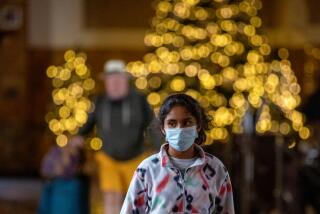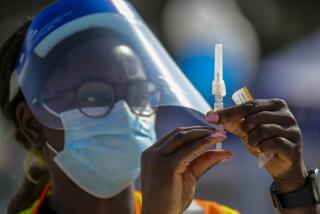How to prevent coronavirus: Wash your hands and ditch the mask
Drugstores have reported skyrocketing demand, and several of Amazon’s top sellers are indefinitely out of stock. Shortages of surgical face masks are a visible sign that the novel coronavirus from China has reached the United States.
But health experts warn that stocking up on the disposable masks could do more harm than good by limiting their availability to doctors and nurses. If the coronavirus outbreak should cause a run on anything, they say, it should be soap and water instead.
“Fear spreads a lot faster than the virus,” said Dr. Jeffrey Klausner, an infectious disease expert at UCLA’s Fielding School of Public Health. “A mask makes you feel better, but you’re missing the more important protective measures.”
There are good reasons to wear masks — namely, to protect others. Surgeons use them so they don’t cough or sneeze into open wounds. Emergency room staff hand them out to visitors with respiratory symptoms to protect others in the waiting area. Doctors diligently swap their masks between visits with immune-suppressed patients, to avoid exposing them to clinging pathogens.
If you’re already sick, mask-wearing is good practice. Donning a paper mask on a crowded train or bus, for instance, can minimize the degree to which a cough or sneeze disseminates infectious fluid onto neighbors and handrails that will be grabbed throughout the day.
But for everyone else, the masks are simply “unnecessary,” said Alex Azar, secretary of the Department of Health and Human Services.
In fact, if the mask-hoarding continues, officials worry there could be a shortage, affecting clinics and hospitals where they’re needed most. N-95 respirator masks, for example, use a more sophisticated filter to protect health workers doing riskier procedures like intubations, Klausner said, but they’re currently a hot item among the public. (Such masks are likely stored up in the Strategic National Stockpile in case commercial supplies are depleted, though officials won’t divulge details for security reasons).
Experts agree that, for viral infections including the common cold and the flu, the most effective way to protect yourself is regular hand-washing with warm water and soap, plus the vigilance to resist touching your nose and mouth.
To wash your hands properly, the World Health Organization suggests scrubbing your palms with a large dollop of soap before interlacing and clasping the fingers, then scrubbing around the thumbs and the backs of your hands. The whole process should take 40 to 60 seconds.
These hygiene practices apply no more to the coronavirus than to other common winter illnesses, such as colds and the flu.
Indeed, for nearly all Americans, the flu presents a far greater health risk than the new coronavirus. Unless you’ve traveled to China in the last 14 days, or spent time in close proximity to a patient with coronavirus symptoms, the risk of contracting 2019-nCoV remains low.
Meanwhile, 19 million to 26 million Americans have been infected with influenza since Oct. 1, 2019, and 10,000 to 25,000 of them have died from it, according to the Centers for Disease Control and Prevention.







